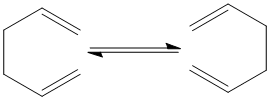
(an example of ring-hopping or fluxional behavior.)
pentadiene molecule to the other end
Migration of a proton from an ammonium ion to
an ammonia moleculeProton exchange
At the half-way point in all narcissistic reactions there are always two interatomic distances that are identical. For example, at the transition state geometry in the SN2 reaction [Cl']- + CH3Cl ⇔ CH3Cl' + [Cl]- both Cl'-C and C-Cl interatomic distances are identical. The presence of this equality can be used in optimizing the transition state by using the first symmetry function in MOPAC, function 1, to define the two interatomic distances as being equal. If this is done then an otherwise unconstrained geometry optimization can be used for generating the transition state instead of the ground state geometry .
Several examples of geometry optimization of transition states for narcissistic reactions are shown in the following table. In each case, all the files involved are contained in a ZIP file that can be downloaded. The general method for modeling a new reaction would be to find an example in the table that most closely matches the reaction of interest, and then to use that example as a template.
| Animation of reaction | ZIP file | Description | ||
| 1,5-hexadiene ⇔1,5-hexadiene | 1,5-hexadiene | Cope rearrangement  |
||
| [Cl']- + CH3Cl ⇔ CH3Cl' + [Cl]- | [Cl']- + CH3Cl | SN2 reaction in aqueous media | ||
| Cyclopentadiene sigmatropic reaction | Cyclopentadiene | Migration of a hydrogen atom from C5 to C4
(an example of ring-hopping or fluxional behavior.) |
||
| Pentadiene sigmatropic | Pentadiene | A hydrogen atom migrates from one end of a pentadiene molecule to the other end |
||
| [NH4]+ + NH3 ⇔NH3 + [NH4]+ | [NH4]+ + NH3 | [NH4]+
+ NH3 ⇔ NH3 + [NH4]+ Migration of a proton from an ammonium ion to an ammonia moleculeProton exchange |
||
| PF5 Berry pseudorotation | PF5 | Berry pseudorotation, transition state symmetry: C4v | ||
| NH3 inversion | NH3 | Ammonia inversion, transition state symmetry: D3h |